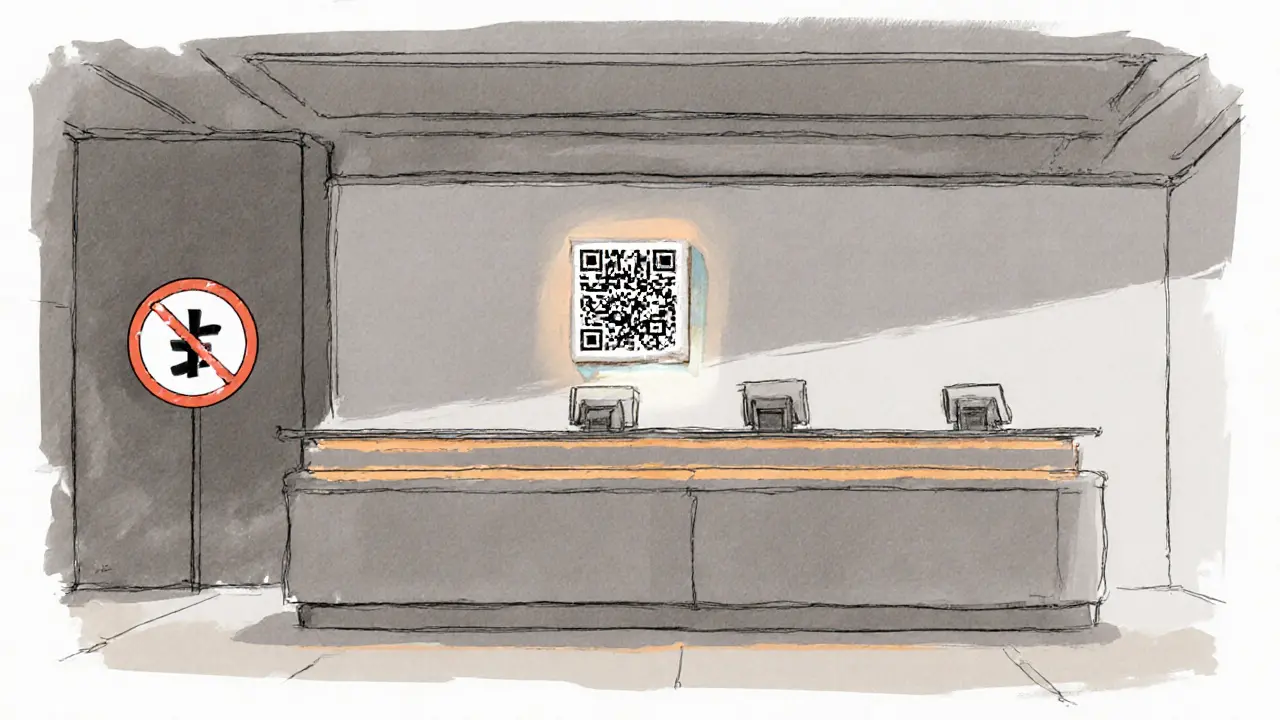Can Businesses in China Legally Accept Crypto? 2025 Guide

China Crypto Business Compliance Checker
Select the type of business activity you're considering in mainland China:
Enter your business activity and location to check compliance status
Cryptocurrency acceptance by businesses in mainland China is a prohibited activity under the 2025 criminalization law that bans ownership, trading, and any commercial use of digital assets. The rule applies to every sector-from e‑commerce sites to brick‑and‑mortar retailers-and carries criminal penalties. In short, you cannot legally take Bitcoin, Ethereum, or any other crypto as payment unless you move your operation to a jurisdiction that permits it, like Hong Kong.
Key Takeaways
- As of May302025, China criminalizes private ownership and commercial use of all cryptocurrencies.
- Violating the ban can lead to fines, asset seizure, and up to three years in prison.
- The only digital currency allowed for business transactions is the state‑backed Digital yuan (e‑CNY).
- HongKong maintains a licensing regime that lets firms accept crypto, offering a clear regional alternative.
- Future policy shifts appear unlikely; the ban is part of a long‑term strategy to reinforce financial sovereignty.
What the 2025 Law Actually Says
The legislation passed on May302025 declares that any individual or entity found holding, transferring, or facilitating cryptocurrencies commits a criminal offense. The law covers:
- Direct ownership of tokens such as Bitcoin, Ethereum, and stablecoins.
- Providing payment gateways, settlement services, or point‑of‑sale terminals that accept crypto.
- Operating exchanges, wallets, or custodial services for Chinese residents.
- Advertising or promoting crypto‑related products.
Enforcement is coordinated by multiple bodies, notably the People's Bank of China (PBOC), the Ministry of Public Security, and the Cyberspace Administration. These agencies monitor online transactions, conduct offline inspections, and require financial institutions to flag any crypto‑linked activity.
Penalties You Can Expect
Those caught accepting crypto face a blend of administrative and criminal consequences:
- Fines: Ranging from ¥100,000 to ¥1,000,000 per violation.
- Asset seizure: All digital assets and related equipment are confiscated.
- Criminal charges: Up to three years imprisonment for individuals; companies can be dissolved and executives barred from future business activities.
Because the law treats crypto as a money‑laundering risk, traditional Know Your Customer (KYC) requirements are superseded by a blanket prohibition-there is no compliance pathway.
Why the Ban Exists: Strategic Rationale
The Chinese government views decentralized cryptocurrencies as a direct threat to its monetary control. Two core motivations drive the crackdown:
- Capital flight prevention: Cryptos enable cross‑border transfers that bypass foreign‑exchange controls.
- Digital yuan promotion: By eliminating competition, the Digital yuan becomes the sole legal digital payment method, giving the state full traceability over transactions.
This strategy aligns with China’s broader push for a sovereign central bank digital currency (CBDC) ecosystem that integrates with existing banking infrastructure.

Comparison: Mainland China vs. Hong Kong
| Aspect | Mainland China | Hong Kong |
|---|---|---|
| Legal status of crypto for businesses | Fully illegal; criminal penalties | Legal under licensing regime; regulated exchanges |
| Allowed digital currency | Digital yuan (e‑CNY) only | Digital yuan not restricted; crypto and stablecoins permitted |
| Regulatory body | People's Bank of China, Ministry of Public Security, Cyberspace Administration | Hong Kong Securities and Futures Commission (SFC), Monetary Authority |
| Compliance burden | Mandatory reporting of any crypto activity; no exemptions | Licensing, AML/KYC requirements; specific compliance frameworks |
| Enforcement trend | Criminalization, arrests, asset seizures | Regulatory oversight, fines for non‑licensed activity |
For a mainland company seeking to stay legal, the only viable route is to relocate crypto‑related functions to Hong Kong or another friendly jurisdiction.
How to Remain Compliant If You Operate in China
Since the law leaves no gray area, compliance means absolute avoidance. Follow this checklist:
- Audit all payment channels: Verify that no crypto wallets, QR codes, or third‑party processors are embedded in your checkout flow.
- Train staff: Ensure sales and finance teams understand that any crypto request must be declined and reported.
- Implement monitoring software: Use approved tools that flag any incoming transaction linked to known blockchain addresses.
- Report suspicious activity: Follow the Ministry of Public Security guidelines for immediate reporting.
- Consider a legal entity in Hong Kong: If crypto payments are essential, set up a separate Hong Kong subsidiary that complies with the SFC licensing regime.
Attempting to hide crypto transactions through VPNs or offshore mixers will almost certainly be detected by the coordinated surveillance network.
Future Outlook: Will the Ban Ever Lift?
All signs point to a stable, long‑term prohibition. The ban aligns with China’s ambition to dominate the global CBDC market and to keep capital flows under state control. While other countries are moving toward clearer regulatory frameworks, China’s multi‑agency enforcement mechanism suggests the ban is designed for permanence.
However, a few scenarios could shift the landscape:
- International pressure: Trade partners could push for more open digital asset policies.
- Technological breakthroughs: If a state‑approved, blockchain‑based token dovetails with the digital yuan, limited crypto‑like use might emerge.
- Domestic demand: Persistent underground markets could force a regulatory recalibration, though no concrete proposals exist yet.
For now, businesses should treat crypto acceptance as a non‑option in mainland China and plan any crypto‑related activities through compliant offshore structures.
Quick Reference Checklist
- Is crypto acceptance allowed in mainland China? No
- Legal digital currency for businesses: Digital yuan (e‑CNY)
- Key enforcing agencies: PBOC, Ministry of Public Security, Cyberspace Administration
- Potential penalty: up to ¥1million fine + up to 3years imprisonment
- Alternative jurisdiction for crypto: Hong Kong (licensed exchanges)
Frequently Asked Questions
Can a Chinese company accept Bitcoin for goods sold inside China?
No. The 2025 law criminalizes any receipt, holding, or processing of Bitcoin within mainland China. Doing so can lead to fines, asset seizure, and possible imprisonment.
Is the digital yuan the only legal digital payment method?
Yes. The state‑backed Digital yuan (e‑CNY) is the sole digital currency permitted for business transactions across mainland China.
What happens if a foreign exchange platform lets Chinese users trade crypto?
The platform is considered illegal under the 2025 prohibition. Chinese authorities can block the service, seize assets, and prosecute both the provider and any Chinese users involved.
Can a mainland business use a Hong Kong subsidiary to accept crypto?
Yes, but only if the crypto activities are fully separated from the mainland entity and the Hong Kong arm holds the proper SFC licence. The mainland company must not receive crypto funds directly.
Is there any legal exemption for state‑owned enterprises?
No. The law applies uniformly to all entities, public or private. State‑owned enterprises must also use the digital yuan for any digital payments.


Fionnbharr Davies
December 16, 2024 AT 15:45It's clear the Chinese authorities have taken a hard line on crypto, and businesses need to adapt quickly. The guide does a solid job of laying out what's allowed and what's not. For anyone operating on the mainland, the digital yuan is the only safe route. Staying compliant now can save a lot of headaches later.
Enya Van der most
December 17, 2024 AT 02:51Exactly! If you're feeling stuck, think of the digital yuan as a fresh canvas – it’s official, traceable, and fully backed by the state. Jump on board and you’ll avoid the legal pitfalls.
Jenny Simpson
December 17, 2024 AT 13:58Honestly, I find the blanket ban a bit theatrical. It feels like the government is more scared of losing control than protecting anyone. Crypto could have spurred innovation, but now it’s just a punchline. Still, the reality on the ground is stark.
Rahul Dixit
December 18, 2024 AT 01:05It’s not just fear, it’s a calculated strategy. By shutting down crypto, the regime eliminates a channel for capital flight and ensures the digital yuan reigns supreme. The surveillance apparatus can now track every transaction. Any deviation is seen as a direct challenge to state sovereignty.
Kamva Ndamase
December 18, 2024 AT 12:11That’s why you’ll hear a lot of fiery rhetoric – the government wants to keep the economic ship on a straight, blazing course. Any crypto‑ish whisper is treated like a rebellious ember. The crackdown is as aggressive as a storm in the desert.
Thiago Rafael
December 18, 2024 AT 23:18According to Article 5 of the 2025 Criminalization Law, the prohibition applies to all entities, public and private. Penalties range from ¥100,000 to ¥1,000,000 per violation, plus possible imprisonment of up to three years. Enforcement is coordinated by the PBOC, Ministry of Public Security, and the Cyberspace Administration. Non‑compliance is therefore both a civil and criminal risk.
Janelle Hansford
December 19, 2024 AT 10:25That’s a thorough breakdown – thanks for the clarity! Businesses can still thrive by pivoting to the digital yuan and focusing on compliant services.
Krystine Kruchten
December 19, 2024 AT 21:31The legal citations are spot on – definatly helps to understand the stakes. Just remember to keep your compliance docs updated.
Iva Djukić
December 20, 2024 AT 08:38From a regulatory arbitrage perspective, the dichotomy between Mainland China and Hong Kong creates a bifurcated ecosystem that is ripe for strategic structuring.
Enterprises seeking to maintain crypto exposure must engineer a jurisdictional separation, often via a Hong Kong subsidiary, to satisfy the licensing requirements of the SFC.
This approach mitigates the risk of cross‑border enforcement, as the PBOC’s extraterritorial reach is limited to activities physically occurring within the mainland.
Moreover, the digital yuan’s integration into the national payments infrastructure provides a low‑friction, state‑backed alternative that aligns with the government’s push for a cashless society.
However, the interoperability challenges between e‑CNY and external blockchain networks remain non‑trivial, demanding robust middleware solutions.
Compliance teams should therefore prioritize AML/KYC mechanisms that can flag blockchain addresses in real time, leveraging state‑mandated monitoring tools.
In practice, this often entails deploying on‑premise blockchain analytics platforms that synchronize with the People’s Bank’s transaction logs.
Failure to adopt such systems could result in asset seizure, as the law expressly authorizes confiscation of digital assets linked to illegal transactions.
Another critical vector is employee training – staff must be able to identify crypto‑related payment attempts and route them to the appropriate compliance channel.
Regular drills and simulated phishing scenarios can reinforce this capability.
Given the punitive environment, an internal whistleblower policy is advisable, encouraging staff to report suspicious activity without fear of retaliation.
The legal landscape also hints at potential future synergies, where a state‑approved token might bridge the gap between e‑CNY and permitted blockchain applications.
Nonetheless, such developments are speculative, and firms should not rely on them for short‑term planning.
Strategically, a dual‑entity model – mainland operations confined to e‑CNY, Hong Kong arm handling crypto – offers the most resilient architecture.
Finally, continuous monitoring of policy updates from the SFC and PBOC is indispensable, as even minor regulatory tweaks can cascade into significant compliance adjustments.
WILMAR MURIEL
December 20, 2024 AT 19:45That’s a wealth of detail – I appreciate the pragmatic steps. It really helps to see the granular actions businesses can take.
Joyce Welu Johnson
December 21, 2024 AT 06:51Wow, the depth is impressive! The drama of navigating two legal systems is almost cinematic.
Ally Woods
December 21, 2024 AT 17:58The ban is crystal clear.
Kristen Rws
December 22, 2024 AT 05:05Totally! We just gotta adapt and move forward. Let’s keep our heads up!
Nilesh Parghi
December 22, 2024 AT 16:11When we step back, the policy looks like a classic case of sovereign control versus technological freedom.
It invites us to contemplate how nations balance innovation with stability.
In the Chinese context, the scales are heavily tipped toward stability.
Adeoye Emmanuel
December 23, 2024 AT 03:18Indeed, the narrative feels like a high‑stakes thriller where the protagonist is the digital yuan, and crypto plays the rebel role.
The stakes are real for every entrepreneur caught in the crossfire.
One must choose wisely which side to champion.
Raphael Tomasetti
December 23, 2024 AT 14:25Bottom line: stick to e‑CNY in China, go crypto in Hong Kong.
Megan King
December 24, 2024 AT 01:31Yeah, that’s the simplest play‑book. Gonna keep it clean and legal.
Rachel Kasdin
December 24, 2024 AT 12:38We must protect our economic sovereignty! Allowing crypto would shred the nation’s financial armor. The only safe currency is the one our government backs.
Lana Idalia
December 24, 2024 AT 23:45If you think crypto is the future, you’re missing the bigger picture – the state’s grip is tighter than ever.
Adapt or disappear.